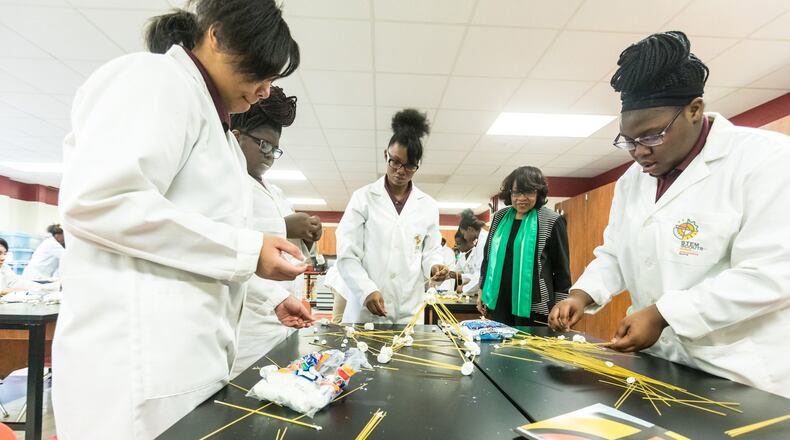Talent is equally distributed, but opportunity is not. This has been proven time and time again in Greater Atlanta, particularly with our black youth. Young black potential can be found in every part of our city. What stands between all that potential and the opportunity to realize it are the often-invisible tripwires that obstruct the path to becoming great.
For Atlanta to reach its full potential, we must clear the path to opportunity for every black young person in our city so that they can acquire all the skills and experiences that will prepare them for success in college, careers and life. But first, we must be aware of the tripwires that obstruct the path for all too many young people.
Where are we seeing challenges?
1. Zip code as destiny. Many young people live in communities where their connections to quality schools, healthcare, out-of-school activities and access to jobs that nurture their potential and provide them opportunities to grow are frayed at best. Living in communities where such access to high-demand careers that offer job opportunities and role models are scarce stifles hope and diminishes motivation.
2. Lack of summer work programs. Much of what makes Atlanta great is the result of public officials and business leaders working together on urgent public matters. Today, business growth in our city is stifled because of the shortage of qualified workers. Yet, thousands of young people who want to fill Atlanta’s talent pipeline could begin to – if the public, private and nonprofit sectors worked together – to create a large-scale summer employment program. We know that when youth find work in summer, they are motivated to complete school, develop marketable skills, are more likely to reach their potential, and are less likely to be involved in negative behaviors.
3. Perceptions. Today, we are less likely than ever to interact socially with people who do not live, worship or think like we do. As a result, we give in to stereotypes. Unconscious bias often casts black young people, especially males, in the most negative and fearful light, thus perpetuating myths that diminish our expectations of them and perpetuating obstacles to their paths to opportunity, social and economic mobility.
These tripwires are not new and I’m sure will come as no surprise to many. But there are real, tangible solutions and the business community has a chance to lead the way. We’ve seen what business can do – Hartsfield-Jackson International Airport, the Olympics, the Westside. We know how big an impact businesses can have on our youth if business leaders decide to take the lead.
The path forward is simple:
1. Internship and Mentorship, scaled. We need to learn how to make mentorship and professional development opportunities an integral part of how black youth grow up instead of being a matter of luck. We’ve seen the success that black youth can have when businesses lean-in to mentoring and internships. Many of our local Fortune 500 companies have standardized programming, and we can emulate the success of established organizations like Big Brothers/Big Sisters and Junior Achievement. Let’s scale the success and create opportunities for small- and medium-sized businesses to play a larger role in mentorship and internships, part-time jobs and bring high potential youth under their wings.
2. Change the Talent Pipeline. Atlanta is a growing city; we see it every day on our highways sitting in traffic that more and more people are coming to our city to work, live and grow. Along with this growth, we see a mindset amongst businesses that they need to look outside Atlanta for talent. This needs to change. Employers of all sizes and industries are saying, “We need help,” while kids are lined up looking for employment. Let’s look within, train up, and build a hub of smart, trained, homegrown, next-gen talent.
3. Lead with Compassion. Over the past 20 years, United Way’s African American Partnership (AAP) group has demonstrated its capacity to become a potent force and is leading with its Powering the Potential initiative. This initiative is putting business leaders like yourselves into the communities to show kids that a life full of promise is not out of reach just because you were born in the wrong neighborhood. All these kids need is to see a leader that looks like them to show them what is theirs for the taking. Lean in and get involved – if not AAP, then with another group that’s building our pipeline of potential.
Is it possible to build Atlanta, the city too busy to hate, into the city too compassionate to leave anyone behind? The answer is up to you. Share your thoughts with me on Twitter @miltonjlittle.
Milton J. Little Jr. is president and CEO of United Way of Greater Atlanta.
About the Author



